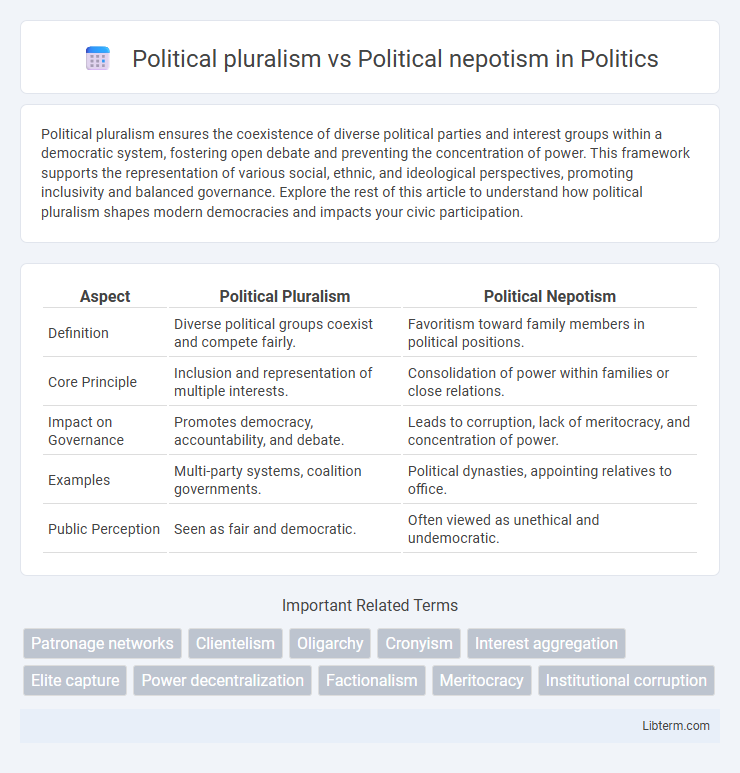Political pluralism ensures the coexistence of diverse political parties and interest groups within a democratic system, fostering open debate and preventing the concentration of power. This framework supports the representation of various social, ethnic, and ideological perspectives, promoting inclusivity and balanced governance. Explore the rest of this article to understand how political pluralism shapes modern democracies and impacts your civic participation.
Table of Comparison
| Aspect | Political Pluralism | Political Nepotism |
|---|---|---|
| Definition | Diverse political groups coexist and compete fairly. | Favoritism toward family members in political positions. |
| Core Principle | Inclusion and representation of multiple interests. | Consolidation of power within families or close relations. |
| Impact on Governance | Promotes democracy, accountability, and debate. | Leads to corruption, lack of meritocracy, and concentration of power. |
| Examples | Multi-party systems, coalition governments. | Political dynasties, appointing relatives to office. |
| Public Perception | Seen as fair and democratic. | Often viewed as unethical and undemocratic. |
Understanding Political Pluralism
Political pluralism embraces diversity by encouraging multiple political parties and interest groups to coexist and compete within a democratic system, enhancing representation and preventing authoritarian dominance. This concept fosters inclusivity and broad participation, crucial for balanced policymaking and safeguarding individual rights. Understanding political pluralism involves recognizing its role in promoting transparency, accountability, and political stability, contrasting sharply with political nepotism, which undermines fairness by prioritizing family ties over merit and democratic principles.
Defining Political Nepotism
Political nepotism refers to the practice of favoring relatives or close associates in political appointments, privileging personal connections over merit and democratic principles. This form of favoritism undermines political pluralism, which emphasizes diverse representation, inclusivity, and competitive participation in governance. Political nepotism often results in diminished institutional integrity, reduced accountability, and weakened public trust in political systems.
Historical Origins of Pluralism and Nepotism
Political pluralism originated in ancient Greek city-states, promoting diverse representation and multiple centers of power to prevent tyranny. In contrast, political nepotism has roots in monarchies and feudal systems, where power was concentrated within familial ties to maintain control and loyalty. The historical development of pluralism emphasizes institutional checks and balances, while nepotism prioritizes hereditary privilege over meritocratic governance.
The Core Principles of Political Pluralism
Political pluralism is grounded in the core principles of diversity, inclusiveness, and competition among multiple political parties and interest groups, ensuring a broad representation of societal interests. This system encourages decentralized power structures and open dialogue, preventing the concentration of authority and fostering democratic governance. In contrast, political nepotism undermines these principles by prioritizing family ties and favoritism over merit, leading to a lack of transparency and limited political participation.
The Dangers and Effects of Political Nepotism
Political nepotism undermines democratic principles by promoting favoritism based on family ties rather than merit, leading to inefficient governance and corruption. This practice distorts political pluralism by concentrating power within a limited group, reducing diverse representation and stifling opposition voices. The resulting erosion of public trust weakens institutions and impedes social and economic development, exacerbating inequality and political instability.
Pluralism vs Nepotism: Impacts on Governance
Political pluralism fosters inclusive governance by promoting diverse representation and competitive political participation, which enhances accountability and policy innovation. In contrast, political nepotism undermines meritocracy, concentrates power within family networks, and often leads to corruption and inefficient public administration. The juxtaposition of pluralism and nepotism significantly influences the quality of governance, with pluralism supporting democratic resilience while nepotism compromises institutional integrity.
Case Studies: Pluralist vs Nepotistic Political Systems
Case studies comparing political pluralism and nepotism reveal that pluralist systems, such as Sweden and Canada, foster diverse party representation and institutional checks promoting democratic resilience and policy inclusivity. In contrast, nepotistic systems often observed in countries like the Philippines and Pakistan exhibit concentrated power within family dynasties, undermining merit-based governance and perpetuating corruption. Empirical data indicate that pluralist democracies generally achieve higher levels of transparency and citizen participation compared to nepotistic regimes, which struggle with accountability deficits.
Social Consequences of Political Nepotism
Political nepotism undermines democratic principles by concentrating power within family networks, leading to decreased political pluralism and limited citizen representation. This consolidation erodes public trust, fosters corruption, and exacerbates social inequality by marginalizing qualified candidates outside the nepotistic circle. Consequently, social tensions rise as communities experience reduced social mobility and diminished access to fair political participation.
Fostering Political Pluralism in Modern Democracies
Fostering political pluralism in modern democracies involves creating institutional frameworks that encourage diverse political parties, interest groups, and civic participation to ensure balanced representation and policy-making. Unlike political nepotism, which undermines democratic principles by promoting favoritism and limiting competition, pluralism strengthens accountability and inclusivity through transparent electoral processes and equal access to political resources. Key strategies include enforcing anti-corruption laws, promoting media freedom, and facilitating citizen engagement in governance to sustain vibrant democratic ecosystems.
Solutions and Reforms to Minimize Political Nepotism
Implementing transparent hiring processes and strict anti-nepotism laws can effectively reduce political nepotism by ensuring merit-based appointments. Encouraging independent oversight bodies and empowering civil society organizations to monitor government actions fosters accountability and deters favoritism. Promoting political pluralism through fair electoral systems and equal access to public office cultivates a competitive environment that limits the influence of familial ties in politics.
Political pluralism Infographic

 libterm.com
libterm.com